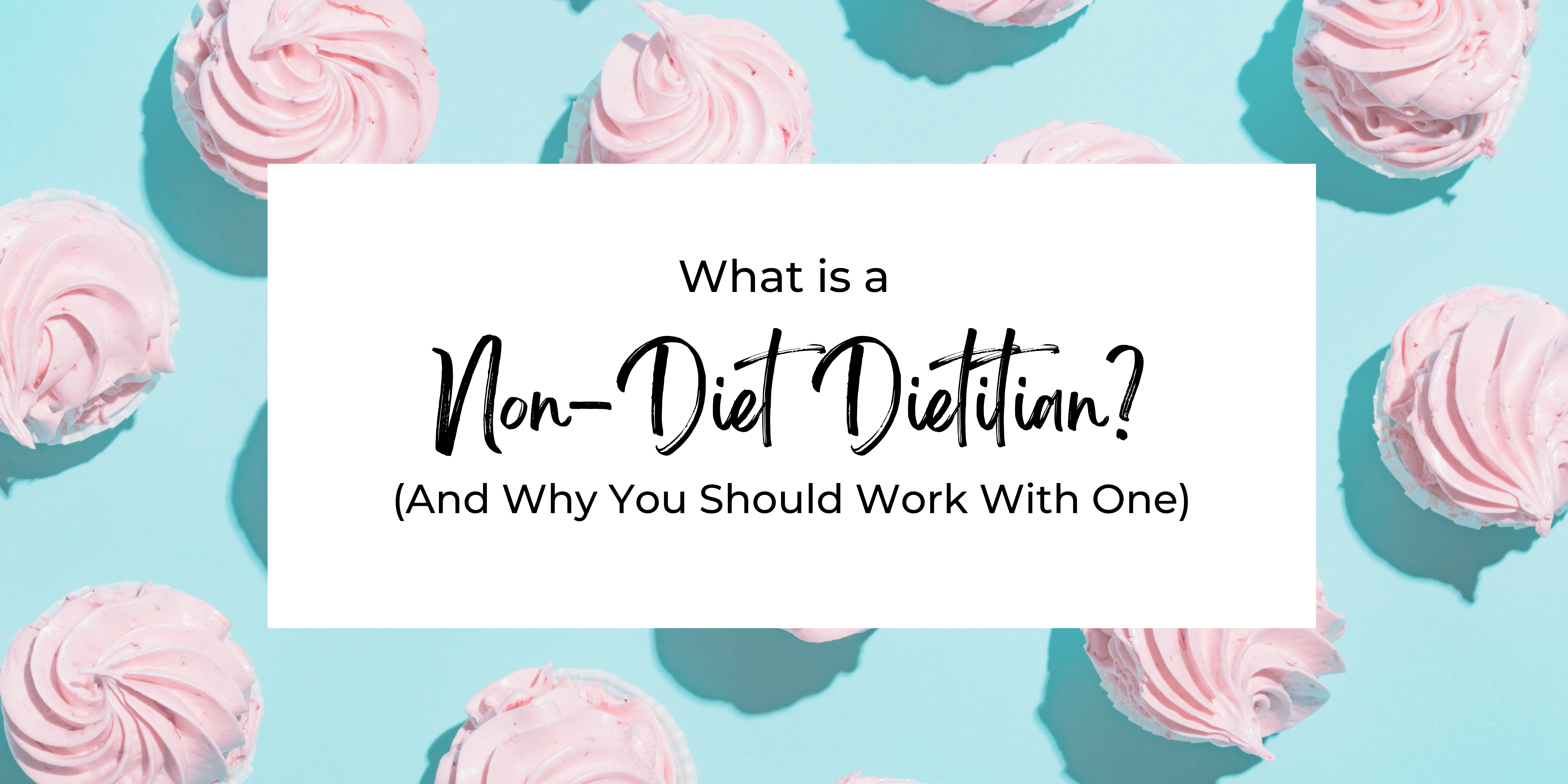Have you ever considered working with a registered dietitian? Read on to learn what a non-diet dietitian is, and why they may be a good fit for you.

What Is A Non-Diet Dietitian?
The term may seem like an oxymoron, but a non-diet dietitian is a real thing!
I am a non-diet dietitian, and I receive lots of confused looks when I try to explain what I do. It feels important to define this term, though, because this approach to health can greatly benefit many people.
To clarify: a registered dietitian is a healthcare provider that is formally trained to identify, diagnose and treat a nutritional concern. A dietitian’s goal is to help someone manage or improve medical conditions or struggles with food and eating behaviors. To become a registered dietitian, one must complete years of extensive education and training, and pass a registration exam. Then they can formally provide provide medical nutrition therapy in a variety of settings.
A non-diet (or anti-diet) dietitian is also a registered dietitian who has extensive knowledge of how food affects a person’s body and brain.
Here are some differences between a dietitian and a non-diet dietitian:
- We do not use the body-mass index (BMI) to guide an individual’s nutrition plan.
- We are against prescribing restrictive or unnecessary diets for weight loss or to manipulate body size.
- Our directive in providing care shifts towards more important markers of health, such as sleep, intake of beneficial nutrients, mental and emotional well-being, and movement.
In short: anti-diet dietitians are against dieting and diet culture.
What Is Diet Culture?
Diet culture is a term that describes modern society’s obsession with the act of dieting and the desire to be thin.
Christy Harrison, a well known non-diet dietitian and the author of “Anti Diet” explains:
“[Diet culture] is Western society’s toxic system of beliefs that: Worships thinness and equates it to health and moral virtue, Promotes weight loss as a means of attaining higher status, Demonizes certain foods while elevating others, And oppresses people who don’t match up with its supposed picture of “health.”
Diet culture is EVERYWHERE, but it can be sneaky.
Here are some ways it can show up:
- Weight loss programs that require you to follow a strict set of eating rules or eat within a certain timeframe
- Cleanses, detoxes, diet teas, or prepackaged meal plans that promote weight loss
- Low-calorie foods geared towards children and teens, or teaching them to avoid unhealthy foods so they won’t “get fat”
- Counting macros or points, or tracking calories for the sake of manipulating your body size
- “Biggest Loser” style competitions in workplaces
- Having “cheat” days or meals after a longer period of food restriction
- Hearing fatphobic comments in movies, books, social media
- Focusing on weight loss alone to help cure an individual’s health concerns
Why Do Non-Diet Dietitians Fight Diet Culture?
Dieting can be really harmful. I cannot say this enough.
Restricting food and practicing extreme eating habits can disconnect us from our natural physical cues and biological processes that we experience when we eat. It can increase food cravings, emotional eating, weight cycling (frequent weight loss and then weight gain), emotional eating, disordered eating, and eating disorders.
To learn more, read my article: Fad Diets: Why We Need to Ditch Them For Good.
My own professional experience has allowed me to witness countless examples of diet culture’s negative impacts on someone’s health and wellbeing.
Because diets suck. They really do.
Once I began learning about Intuitive Eating and the HAES approach to healthcare, I enthusiastically joined the non-diet space. I started noticing the effect it had on clients: more positive, sustainable eating patterns and better relationships with food and their bodies.
So, want to know if a non-diet dietitian is right for you?
Top Reasons To Work With A Non-Diet Dietitian
1. You want to receive non-biased healthcare recommendations.
Traditionally, healthcare associates weight loss with better health. Unfortunately, those in larger bodies are told far too often to “just lose weight” when they are seeking healthcare support for ailments.
The problem is that weight, alone, does not equal health. Focusing on a person’s weight may prevent a practitioner from seeing a more important reason a person is suffering. And it can cause unnecessary stress and shame to the patient.
A non-diet dietitian practices from a weight-neutral standpoint. In treatment, this allows us to focus on what a person needs in that moment rather than pushing a weight-loss agenda or unsustainable and restrictive diet.
Compassionate care can do wonders for a person’s mental and physical health.
2. You want food autonomy.
If you’ve ever been on a diet, you’ve probably been told to restrict or avoid certain foods, or that certain foods are “bad” or “good.” Our human brains do NOT like this approach to food. It causes us to rebel. This is why food restriction often leads to binging, and why diets don’t last.
Non-diet dietitians try to make food neutral. We recognize that everyone has different food preferences, levels of access to food, and medical histories. We strive to honor those points without judgment. We embrace freedom of food choice.
A more respectful and intuitive way of eating can be achieved without requiring you to give up what you enjoy.
3. You want to improve your relationship with food or your own body.
With diet culture at large, it is understandable why so many people suffer from a poor relationship with food or disordered eating habits. And why negative body image is rampant in the dieting world.
In the non-diet space, we know that a person’s relationship with food and eating is far more complex than what diet culture advertises. Our goal is to support you while you get curious about your own eating history, and how it has lead to your relationship with food today. We will work with you to cultivate a more healthy and natural relationship with food so you can enjoy what’s most important to you.
4. You would like to improve your health.
Non-diet dietitians are still fully trained nutrition professionals, therefore we can help you understand eating patterns that may assist your health goals.
In the non-diet space, we just avoid harmful dieting recommendations that can actually make mental or physical health outcomes worse.
For example: my background is in Preventive Cardiology. In that space, I saw many clients try to improve their heart health by focusing on weight loss as the primary goal (after being told to do so by a provider). Many of them would start a ketogenic diet, assuming this was the fastest way to lose weight. The problem: following a high saturated fat, low fiber diet actually made their health markers worse. And they felt worse, with stomach distress, headaches, muscle aches, sleep issues, etc.
Non-diet dietitians strive to follow evidence-based nutrition recommendations that are practical and personalized for each individual client. We consider a person’s lived experiences and unique goals when discussing their care. When appropriate, we work as a team with other health professionals to optimize the client’s experience. We still value health, but remove diet culture.

Want to learn more?
If you’d like to know more about how working with a non-diet dietitian could benefit you, connect with me by signing up for a free 15 minute inquiry call here. Let’s see if we’re a good fit!
You can also join my upcoming virtual Intuitive Eating Support Group where you’ll get a sense of community and ongoing support while navigating Intuitive Eating. You can learn more and register by clicking here.



